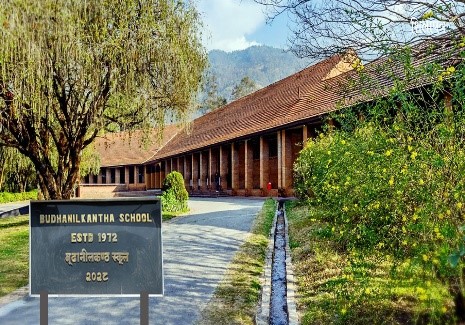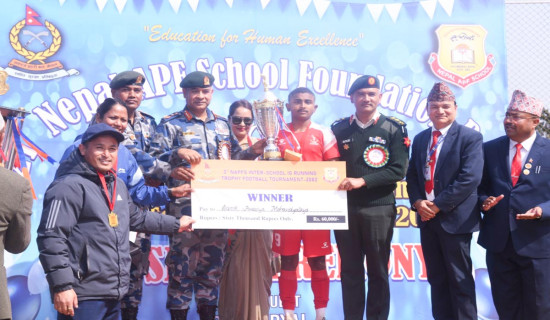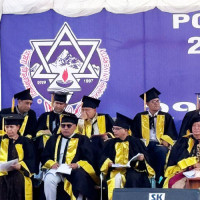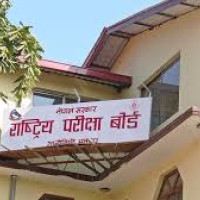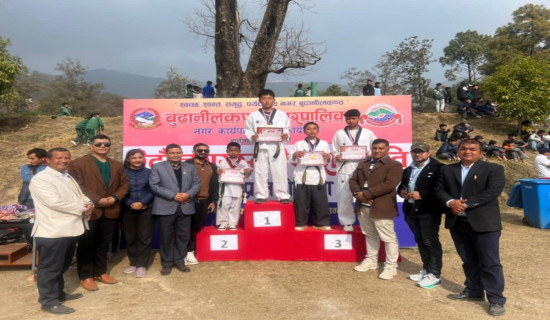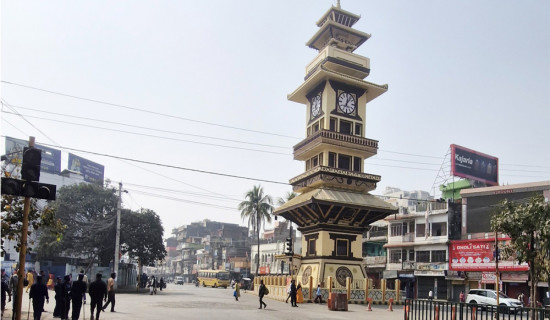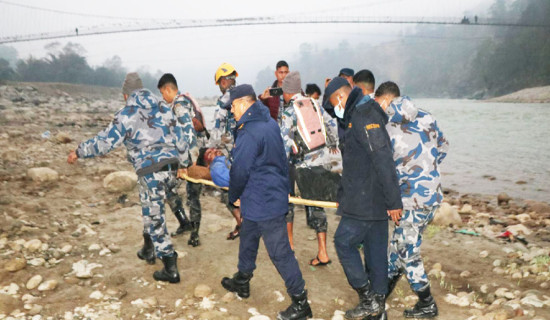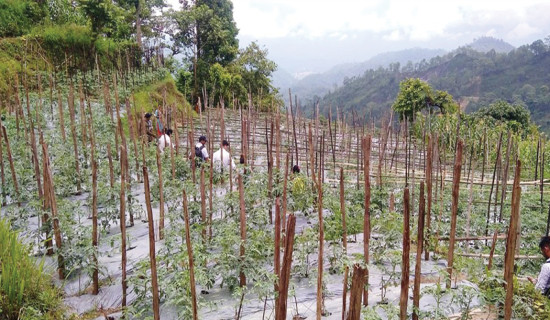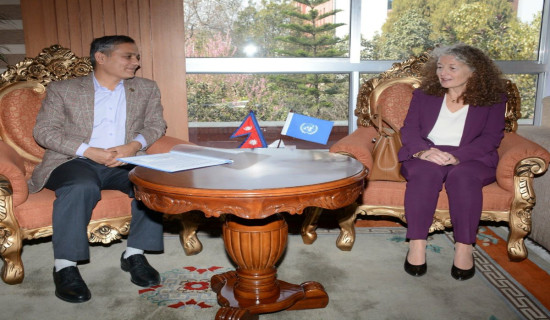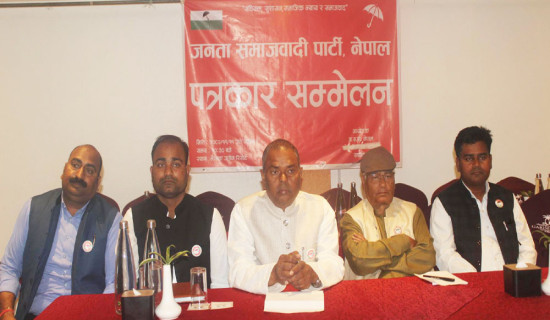- Monday, 23 February 2026
BNKS Knowledge Park: An Epitome of Learning and Earning with Fun
Sonika Poudel
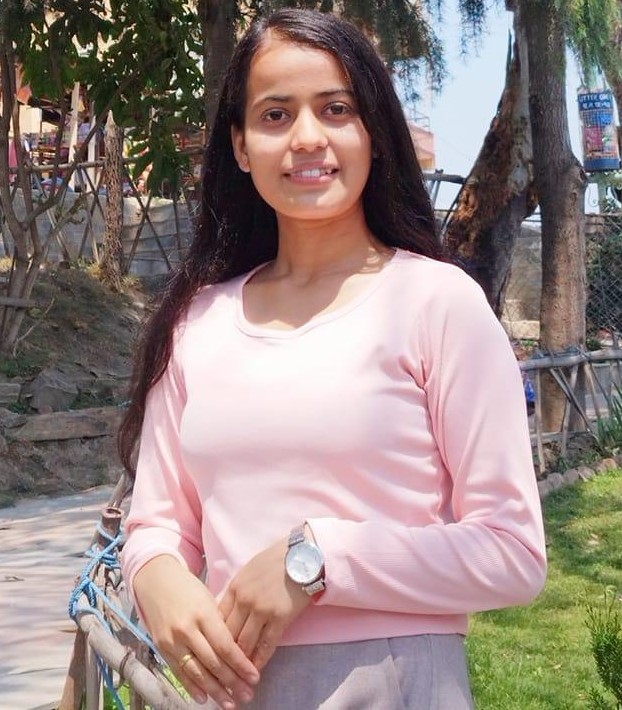 If you are from Kathmandu
valley then Budhanilkantha School might not be new for you and, if you are an
outsider still not to worry about as I will be presenting about it and its
special attraction.
If you are from Kathmandu
valley then Budhanilkantha School might not be new for you and, if you are an
outsider still not to worry about as I will be presenting about it and its
special attraction.
The idea of
establishing a model school that would provide quality education to students
coming from every walk of life, was initiated by the Late King Mahendra in
consultation with the then British Council representative, Lynndon Clough. After
much planning and forethought, a joint venture between the Government of the
United Kingdom (technical and financial assistance) and the Government of Nepal
(access to land) made Budhanilkantha School come into existence in 1972. It is
commonly known as BNKS which is named after the Budhanilkantha Temple, a famous
Hindu temple located nearby. The school campus is situated in a serene and
spacious environment, providing a conducive atmosphere for learning. It offers
various facilities, including well-equipped classrooms, science and computer
labs, a library, sports grounds, and hostels for residential students.
Budhanilkantha school
places a high value on character development and strives to generate
responsible and disciplined students. The school encourages students to
participate in sports, cultural activities, and social service initiatives in addition
to academic disciplines. It also has various clubs and societies that cater to
students' interests, such as music, dance, debate, and photography. Budhanilkantha
School has produced numerous successful graduates who have succeeded in
academia, business, politics, and the arts over the years. The school has
played a significant role in shaping the educational landscape of Nepal and
continues to remain one of the country's most prominent schools.
Mr. Dhruba Kumar
Shrestha, M.Sc. graduate in Natural Resources Management, has been working as a
senior teacher in Budhanilkantha School nearly three decades. He is the
initiator of BNKS Knowledge Park. Without his proposal, hard work and
dedication, the dream ‘BNKS Knowledge Park’ would not have been possible. Along with him,
Mr. Hom Nath Acharya, the Principal of the school and Mr. Kashiram Sharma, the
chief Administrative Officer of the school have been truly supportive and
motivating since the beginning of its concept. The concept of BNKS Knowledge
Park was initiated and began to be materialized on April 14, 2021 (1st
Baisakh, 2078 BS). The site of the Park is located at the northern side of the
existing Pestalozzi Vocational Centre (PVC) Building of the school and has
occupied approximately 150 ropani of area coverage.
OBJECTIVES
The primary objective
of the Park is to develop a Model Educational Hub where students can learn
different aspects of life skills practically based on "Learning by Doing
and Seeing is Believing" philosophy. Other objectives include:
·
To produce fresh vegetables, fruits and
medicinal herbs for the school kitchen, staff and well-wishers.
·
To exploit the waste land of school
wisely for income generating activities.
·
To develop an eco-friendly garden where
different components are directly/indirectly inter connected and interrelated
with each other.
·
To develop a field gene bank where the
rare and valuable species of plants are conserved in their natural environment.
COMPONENTS
The knowledge park is
blessed with different components. It resembles a beautiful piece of nature.
The special features of this park are discussed as:
· Home garden unit:
A model kitchen/home garden is made on the premises of the Knowledge Park. Its
main objective is to teach the students to design and operate home garden
suitable for a family. It also aims to provide seedlings of seasonal vegetables
and other materials to the school family at subsidized rates.
·
Coffee garden:
It has occupied approximately 8 ropani of area. It is a shady area and suitable
for coffee plants. More than 700
saplings of Arabica coffee (Coffea arabica) have been planted in the
site and its performance seemed encouraging. Planning for installation of a coffee
processing unit in the site is being done to serve organic coffee to the school
kitchen and visitors.
·
Cardamom block:
Trimmed utis trees (Alnus nepalensis) have been providing shade to more
than 5000 saplings of different varieties of cardamom. The area of the block is
about 10 ropani and 2000 saplings of Ramsai variety and 3000 saplings of TODE
(Bharlang) variety have been planted in the site. After harvest, fresh cardamom
will be served to the school kitchen and visitors.
·
Biodiversity garden:
The School Biodiversity Garden was established at the School in 2013 AD with
the financial support from USC Canada Asia and technical support from National
Agriculture Gene Bank, Khumaltar. Approximately 20 ropani of land is occupied
by the garden and its primary objective is to conserve the economically
important indigenous species of plants: fruits, vegetables, flowers, medicinal
plants and other rare plants in the field itself. There are two different
blocks under the biodiversity garden:
ü Fruit
diversity garden: Indigenous fruits from different
ecological regions are planted in the block including; apple, peach, pear,
plum, chestnut, kiwi, walnut, khamo, chuli, persimmon, Nepalese hog plum, lime,
lemon, trifoliate, pumelo, citron, orange, cumquat, guava, jamun, pomegranate,
mango, etc.
ü Medicinal
plant block: Valuable medicinal plants found in
different parts of the country are planted in the block. The major medicinal
plants are: serpentine, aloe vera, asparagus, wild garlic, sweet flag, malabar
nut tree, cinnamon, mugwort, himalayan yew, lemon grass, gooseberry, toothache
tree, bengal quince, water pennywort, mentha, turmeric, ginger, etc.
Vegetable
production block: It is one of the major components of
BNKS Knowledge Park and has been supported by the Krishi Gyan Kendra, Lalitpur
under the PMAMP (Prime Minister Agriculture Modernization Project) of
Provincial Government of Bagmati Province and started from April 14, 2021 (1st Baisakh, 2078 BS) here at the
School. Nearly 30 ropani of land is occupied by the project. There are
altogether 30 structures for vegetable production purposes (temporary
structures: 26 plastic tunnels and permanent structures:4). These structures
facilitate the production of off-season vegetables in the farm.
High
value vegetables: tomato, cauliflower, broccoli, kohlrabi, akabare, coriander,
cabbage, asparagus, cucumber, sponge gourd, bitter gourd, summer squash,
pumpkin, bottle gourd, beans, cowpea, carrot, radish, broad leaf mustard, are
grown as per their season. Besides this, vegetables are growing in open areas
as well as per their normal growing season. It is moving towards the organic
farming technique and vermicompost, cow dung, poultry manure, compost, azolla,
liquid manure, Pseudomonas, Tricoderma, Azetobactor, mycorrhiza are being used
as the main source of nutrients for the plants. Drip irrigation system, EM
Technology, Integrated Pest Management (IPM) techniques, inter cropping/mixed
cropping/relay cropping, companion cropping systems are applied in the farm.
·
Fruit orchard:
The northern open site adjoining with the Saraswoti temple is the allocated
area for the fruit garden of BNKS Knowledge Park. It has occupied about 40
ropani of land and more than 1200 high value fruits: avocado, persimmon, star
fruit, sun kagati, cumquat, guava, jamun, mango, macadamia nut, pecan nut,
pear, peach, etc. were already planted. Layout and plantation were accomplished
with the support from the Department of Environment, Babarmahal and District
Forest Office, Hattisar, Kathmandu.
·
Mushroom unit:
This is one of the new projects of BNKS Knowledge Park in which priority is given to produce Shiitake mushroom considering
the availability of the raw materials in the locality. It has been supported by
the Krishi Gyan Kendra, Lalitpur. Mushroom Seed Nepal and Research Centre Pvt.
Ltd, Nayathimi, Bhaktapur and other related institutions are also coordinated for
technical support. Production of Shiitake mushrooms is ongoing.
·
Mini nursery and High-tech fruit
nursery: Mini nursery is taken as the plant bank of BNKS
Knowledge Park where varieties of economically important indigenous plants are
kept with proper care for further multiplication and replanting in the fruit
garden. High tech fruit nursery is also one of the new projects of the
Knowledge Park and supported by the Agriculture Department of the
Budhanilkantha Municipality, Hattigauda. The main objective of the project is
to involve the students to propagate the high value fruits to generate income
for the students themselves and farm as well.
·
Biodiversity trail:
Biodiversity trail from the existing metal workshop to the vegetable production
block has been already completed. It facilitates collecting the required
materials/equipment for the farm, to dispatch the produce and also makes it
convenient to visit the different components of the Park within a short period of time. This project has been
supported by the ministry of Physical Infrastructure and Transport, Department
of Roads, Minbhawan, Kathmandu.
·
BNKS seed library:
It is the place of collection of indigenous seeds of economically important
plants found in different agro- climatic zones of the country. It is one of the
important practical activities of the students under life skills education
where students are assigned to collect the important seeds of their locality
with detailed information and present it in the class as a part of the project
work.
·
Bee keeping unit:
As plenty of honey flora are available in the surroundings, it seems there is a
good possibility of apiculture in the park. It facilitates pollination and also
helps to increase the production of fruits and vegetables in the farm. Apis
cerana species of 6 populated hives are already kept in the farm and
planning to increase its numbers in the days ahead. It facilitates the students
to learn different aspects of Apiculture practically.
·
Animal husbandry unit:
This was one of the proposed projects of BNKS Knowledge Park and the proposed
site is just above the existing vegetable production block. It is estimated to
bring around 30 cattle in the unit and become self- reliant in milk and its
products. Initially, few cows will be kept and its capacity will be increased
gradually in the days ahead. In addition, with this, goat, swine, rabbit,
poultry, will also be added in the unit. The initial field levelling work has
been already completed for the purpose and the construction work of cowshed
along with its interior design are in progress. As cow dung and urine are
essential inputs of organic farming, this project is supposed to be the
foundation for the farm.
·
Solid waste management:
Budhanilkantha School is a fully residential school and approximately 700-800
kg solid waste is released each day. 3R Principle (Reduce, Reuse and Recycle)
is followed to manage the waste. Organic waste is used to prepare compost
required for crops growing in the farm. EM Technology is being used to prepare
compost. Vermiculture unit: Eisenia foetida (Red worm) is used for
vermicomposting purposes. Liquid manure is being prepared and used regularly.
· Micro hydro power house:
This is one of the attractive demonstration projects where people can learn how
energy is generated from the limited source of water. Its capacity is 300
watts, the smallest micro hydro unit in the country, probably in the world as
well. This project was completed in 1997 and still it is in good condition in
which financial support was received from Pestalozzi Overseas Children's Trust
(POCT), UK, technical support from Intermediate Technology Development Group
(ITDG), Nepal and turbine was manufactured in Patan Yantrashala.
And now there are still
many projects yet to be implemented. Some of the future projects are discussed
as:
·
Post-harvest technology unit:
It is the proposed project of the BNKS Knowledge Park. Solar dryer, electric dryer
and other appropriate equipment will be used for the purpose. This project will
be run in combination with the cooking unit of the life skills education. It
includes the techniques of chana/sukuti, sinki, pickles, gundruk, tomato
ketchup, jam, jelly, marmalade, fermented food items (wine).
· Aquaculture unit:
At least 2 ponds (plastic pokhari) are planned to be constructed to collect
water for irrigation and facilitate aquatic ecosystems in the park. Aquatic
plants; azolla, simrayo, lotus, and aquatic animals; fish, tortoise, frogs,
were planned to be included in the unit.
· High tech bio lab:
It is another proposed dream project of the BNKS Knowledge Park. It will be
well-equipped with the modern scientific equipment where microclimatic
elements: relative humidity/moisture, light, rainfall, temperature, will be
maintained as per the requirements. It will be the computerized system where
appropriate Apps with sensors will be installed and connected with the person
concerned. Tissue culture, inoculation, disease/insect identification, plant
propagation, seed germination test, incubation and other sensitive experiments
will be carried out in the lab. CC cameras will be installed at proper places.
It is supposed to be an ideal place to carry out the practical activities and
other aspects of life skills education.
· Electrification unit:
Electric lines with the required number of electric poles will be fixed in
different parts of the Knowledge Park to facilitate its various activities. The
Nepal Electricity Authority is supporting to complete this project.
· Mini library:
Map of the park, brochure, proposals, booklets, pamphlets, leaflets, text
books, reference books and other educational materials will be managed at the
premises of the Park to facilitate the teaching-learning activities.
Apart from them other
components will also be added to the BNKS Knowledge Park in due course of time
to make it a true Educational and Innovation Centre of the nation.
Truly, BNKS Knowledge
Park is inspiring students to learn about the agricultural activities in their
daily lives. During our visit, we interviewed one of the students of class 6
and he said, “I wanted to study in this school and it feels like my dream came
true. In my previous school I was not much active and this somehow hindered my
personal development but now I am more than satisfied with the learning from
this one.” He even showed his work which was planting of persimmons in a
plastic bag with proper labelling. We were really thankful toward Resham Shahi,
teaching personnel and alumni of BNKS
for his time and made our visit really fruitful. He said, “I am more
than happy to be a part of it and serve my own school. I am hopeful that the
concept of knowledge park will be disseminated all over the country and
students will be more practically- trained and learning will be effective.”
Taking BNKS as an inspiring institute, different schools all over Nepal have
taken the initiative of implementing the motto of BNKS. Dhruba Kumar Shrestha
sir is truly happy with these steps of schools and he wishes for the new world
of practical education and learning through further more interventions and
initiatives.
Certainly, knowing about BNKS Knowledge Park is not only enough unless
you yourself won’t visit it once. It really motivated us and we are eager to
pay our visit to the park in upcoming days too. Not only school level students
but also university level professors, can pay their visits to an ideal
learning center for better learning. You are welcomed there every time so just
grab your camera and let’s meet up there again for yet another fruitful
learning and experience.
(The author is pursuing an Msc in agriculture from TU and she can be contacted at poudelsonika07@gmail.com)

